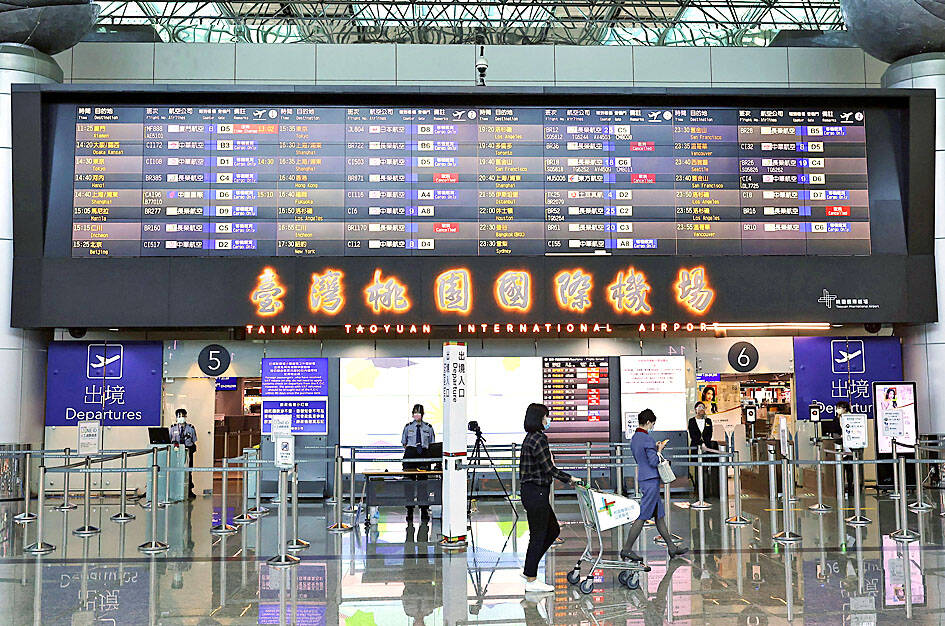The Tourism Bureau on Friday scrapped a requirement that members of outbound tour groups receive three shots of COVID-19 vaccines before they can travel abroad, following a backlash from industry representatives.
The requirement was included in the initial version of the bureau’s updated guidelines that were published on Friday afternoon, which sparked an outcry from travel agencies.
The bureau later removed the requirement following talks with the Travel Agent Association.

Photo: Ann Wang, Reuters
The decision factored in the opinions of travel agencies and the nation’s wide vaccination coverage rate, the bureau said, adding that the plan has been approved by the Central Epidemic Command Center (CECC).
With the update, Taiwan no longer has any requirements on the vaccination status of outbound travelers, who should heed the entry requirements of their destination countries with regard to COVID-19 vaccination status, said Centers for Disease Control Deputy Director-General Chuang Jen-hsiang (莊人祥), who is the CECC’s spokesperson.
The guidelines are to be issued to travel agencies nationwide today, ahead of the planned lifting of a ban on inbound and outbound tour groups on Thursday next week, the bureau said.
The bureau also elaborated on its new guidelines for group travel that are to take effect on the same day, saying that members of inbound tour groups may not sit at the same table with local diners at restaurants.
The measure aims to protect tourists, it said.
Members of tour groups must wear masks at all times, expect when eating or drinking, the bureau added.
Taiwan is also on Thursday next week to end mandatory quarantine for arrivals as part of its new “0+ 7” policy that would replace the “3+4” policy, which requires arrivals to quarantine for three days and observe four days of “self-initiated epidemic prevention.”
The new policy would require arrivals to observe seven days of “self-initiated epidemic prevention,” during which independent travelers would be subject to the rules that apply to tour groups: They can go outside and dine alone, but cannot sit with people they do not know, on condition that they test negative for COVID-19 within the previous two days, the CECC has said.
Each tour group member would be given four rapid test kits upon arrival, and be required to take one test at the airport and the others every two days during their stay.
They can share a room with their travel partners, but cannot change rooms or share rooms with other tour members during their stay in Taiwan.
If a tour group member contracts COVID-19 while in Taiwan, they would be taken to a government-run quarantine facility at their expense, while other members of the tour group would be allowed continue with their itinerary.

A group of Taiwanese-American and Tibetan-American students at Harvard University on Saturday disrupted Chinese Ambassador to the US Xie Feng’s (謝鋒) speech at the school, accusing him of being responsible for numerous human rights violations. Four students — two Taiwanese Americans and two from Tibet — held up banners inside a conference hall where Xie was delivering a speech at the opening ceremony of the Harvard Kennedy School China Conference 2024. In a video clip provided by the Coalition of Students Resisting the CCP (Chinese Communist Party), Taiwanese-American Cosette Wu (吳亭樺) and Tibetan-American Tsering Yangchen are seen holding banners that together read:

UNAWARE: Many people sit for long hours every day and eat unhealthy foods, putting them at greater risk of developing one of the ‘three highs,’ an expert said More than 30 percent of adults aged 40 or older who underwent a government-funded health exam were unaware they had at least one of the “three highs” — high blood pressure, high blood lipids or high blood sugar, the Health Promotion Administration (HPA) said yesterday. Among adults aged 40 or older who said they did not have any of the “three highs” before taking the health exam, more than 30 percent were found to have at least one of them, Adult Preventive Health Examination Service data from 2022 showed. People with long-term medical conditions such as hypertension or diabetes usually do not

POLICE INVESTIGATING: A man said he quit his job as a nurse at Taipei Tzu Chi Hospital as he had been ‘disgusted’ by the behavior of his colleagues A man yesterday morning wrote online that he had witnessed nurses taking photographs and touching anesthetized patients inappropriately in Taipei Tzu Chi Hospital’s operating theaters. The man surnamed Huang (黃) wrote on the Professional Technology Temple bulletin board that during his six-month stint as a nurse at the hospital, he had seen nurses taking pictures of patients, including of their private parts, after they were anesthetized. Some nurses had also touched patients inappropriately and children were among those photographed, he said. Huang said this “disgusted” him “so much” that “he felt the need to reveal these unethical acts in the operating theater

Heat advisories were in effect for nine administrative regions yesterday afternoon as warm southwesterly winds pushed temperatures above 38°C in parts of southern Taiwan, the Central Weather Administration (CWA) said. As of 3:30pm yesterday, Tainan’s Yujing District (玉井) had recorded the day’s highest temperature of 39.7°C, though the measurement will not be included in Taiwan’s official heat records since Yujing is an automatic rather than manually operated weather station, the CWA said. Highs recorded in other areas were 38.7°C in Kaohsiung’s Neimen District (內門), 38.2°C in Chiayi City and 38.1°C in Pingtung’s Sandimen Township (三地門), CWA data showed. The spell of scorching